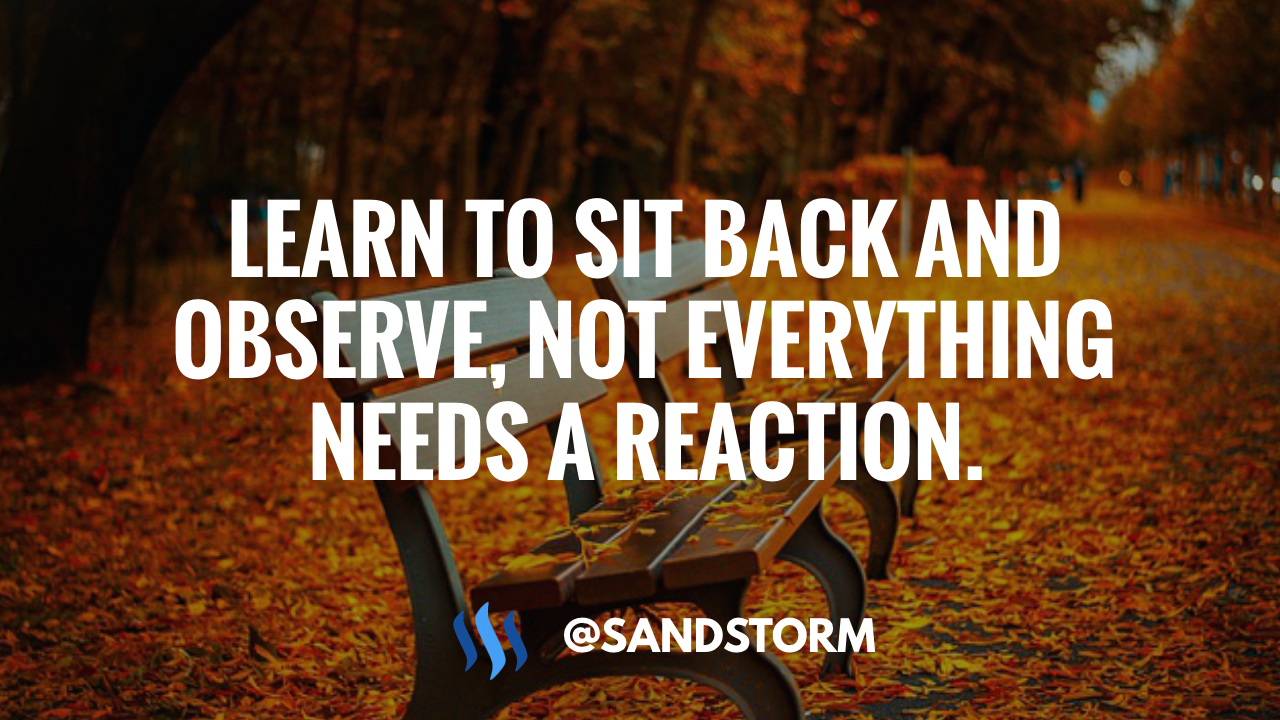In a fast-paced world driven by constant connectivity and instant gratification, the art of patience seems to be fading into the background. The digital age has conditioned us to respond swiftly, make quick decisions, and constantly be on the move. However, there is wisdom in the age-old adage, “Learn to sit back and observe. Not everything needs immediate action.” In a society that often values busyness over contemplation, it’s crucial to explore the benefits of slowing down, taking a step back, and embracing the power of observation.

The Cult of Busyness: A Fast-Paced Society
Modern society is marked by a relentless pursuit of productivity, with individuals often glorifying busyness as a badge of honor. The constant pressure to stay connected, respond promptly to messages, and meet tight deadlines can lead to a cycle of perpetual motion. In this whirlwind, the importance of contemplation and observation is overshadowed by the urgency of immediate action.
must read= learn to sit back and observe.
The Power of Observation: A Forgotten Skill
Observation is a fundamental skill that often gets overlooked in the hustle and bustle of daily life. It involves attentively watching and understanding the world around us, taking in information, and making thoughtful assessments before jumping into action. Cultivating the ability to observe provides a valuable perspective that can lead to more informed decision-making.
The Art of Sitting Back: A Counterintuitive Approach
Sitting back doesn’t mean disengaging or being indifferent. It’s a conscious decision to step away from the constant pressure to respond immediately and, instead, take the time to absorb the situation. This counterintuitive approach allows for a deeper understanding of circumstances and promotes a more thoughtful response.
Breaking the Cycle of Reactivity: Mindful Decision-Making
Immediate reactions are often driven by emotions or external pressures, resulting in decisions that may not align with our long-term goals or values. By learning to sit back and observe, individuals can break free from the cycle of reactivity. This pause enables a shift towards mindful decision-making, where actions are guided by intention rather than impulse.
Enhancing Emotional Intelligence: Understanding Before Reacting
Observation is a cornerstone of emotional intelligence – the ability to recognize, understand, and manage our own emotions while empathizing with others. By taking the time to observe, individuals can gain insights into their emotional responses and those of others. This self-awareness fosters better communication, conflict resolution, and overall relationship management.

Learning from the Past: Historical Perspectives on Observation
Throughout history, many influential figures have emphasized the importance of observation. Leonardo da Vinci, known for his keen powers of observation, once said, “Learn to see. Realize that everything connects to everything else.” By studying the works of such visionaries, we can draw inspiration for incorporating observation into our own lives.
The Paradox of Time Off: Productivity through Rest
The phrase “not everything needs immediate action” implies that some matters benefit from time off. Taking breaks, whether short moments of reflection or more extended periods of relaxation, is essential for maintaining mental well-being. Contrary to the belief that constant action leads to productivity, research shows that incorporating downtime enhances creativity, problem-solving skills, and overall effectiveness.
Mindfulness Practices: Techniques for Cultivating Observation
In a world that encourages constant movement, mindfulness practices provide tools for cultivating observation. Techniques such as meditation, deep breathing, and mindful listening help individuals become more present and attuned to their surroundings. These practices not only enhance observation skills but also contribute to overall mental and emotional resilience.
The Role of Technology: Finding Balance in the Digital Age
While technology has undoubtedly accelerated the pace of life, it can also be harnessed to support the art of observation. Tools like digital detox apps, mindful technology usage, and intentional breaks from screens can create space for reflection and observation. Striking a balance between the benefits of technology and the need for contemplation is crucial in today’s digital age.

Conclusion: Embracing the Art of Observation
In a world that often values immediacy, the art of sitting back and observing is a skill worth cultivating. It empowers individuals to make more informed decisions, enhances emotional intelligence, and contributes to overall well-being. By recognizing that not everything requires immediate action, we can break free from the cult of busyness and embrace a more intentional and thoughtful approach to life. So, let’s learn to sit back, observe, and discover the transformative power of taking our time in a world that often seems to be in constant haste.
